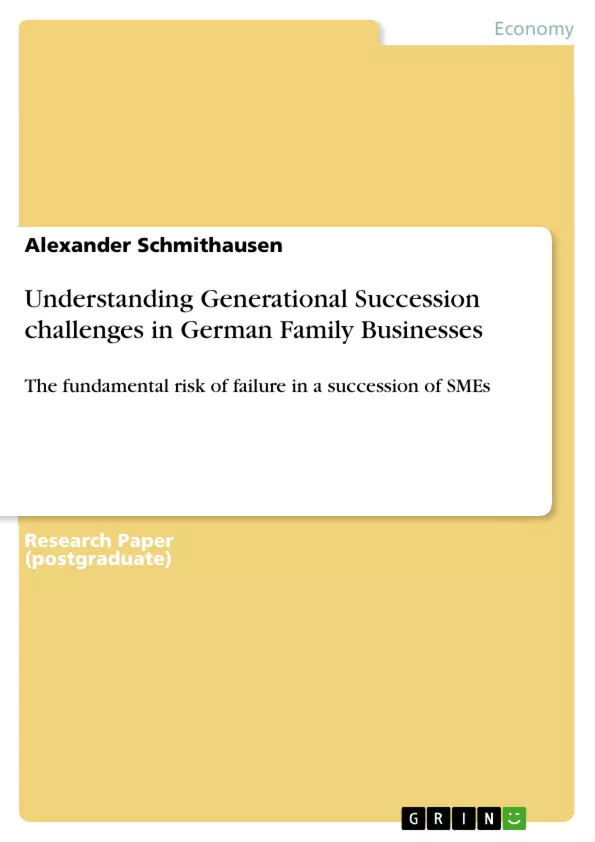Business succession is always a challenging time for any business, but generational change is often a critical factor in the success or demise of family-run businesses. During period of generational change, the company offers both the incumbent and the successor a great challenge. This sensitive issue thus has to be conducted with careful planning because it is one of the most critical phases in the life cycle of a company, with a lot of chances and risks linked to the process. Further successions are also complicated, with half of established family run companies successfully reaching the second generation stage, but only around three or four percent successfully mastering the handover to a third generation. The causes of these succession issues are varied, and the challenges they create will be investigated in this piece. As such, further research is needed in this area, including the specific succession challenges faced in German Family Businesses, and strategies to overcome them. The primary research question is:
What are the key generational challenges faced by German Family Businesses, and to what extent do they create risks of failure for these businesses?
Inhaltsverzeichnis (Table of Contents)
- Introduction and statement of research question
- Literature review of key literature
- The succession process
- The role of the founder
- The role and perspective of the next generation
- The need for succession analysis
- Best practice
- Discussion of and resolution of qualitative vs. quantitative approaches to the research
Zielsetzung und Themenschwerpunkte (Objectives and Key Themes)
This research aims to explore the key generational challenges faced by German Family Businesses and their potential impact on the businesses’ risk of failure.- The critical role of leadership succession in family-owned businesses
- The challenges of transitioning leadership between generations in family businesses
- The potential for conflicts between family and business interests in succession planning
- The importance of knowledge transfer and preserving 'familiness' in family businesses
- The influence of external investors on succession processes in family businesses
Zusammenfassung der Kapitel (Chapter Summaries)
The first chapter introduces the research question, highlighting the challenges of generational succession in family businesses, particularly in Germany. The chapter emphasizes the critical nature of this process for the success of the business, citing statistics on the low survival rates of family businesses beyond the second generation. The second chapter provides an extensive literature review, analyzing key factors influencing the success of succession planning. It delves into five crucial areas: the succession process itself, the role of the founder, the perspective of the next generation, the need for multi-level analysis, and best practices in succession planning. The chapter also emphasizes the importance of tacit knowledge transfer and the concept of 'familiness' in maintaining a family business's competitive advantage. The third chapter discusses the research methodology, specifically the decision to use qualitative or quantitative data. The chapter highlights the benefits of qualitative research in achieving a deeper understanding of the data and its specific meaning.Schlüsselwörter (Keywords)
This research explores the topic of generational succession in German Family Businesses, analyzing the challenges, risks, and strategies associated with this crucial process. The study focuses on key themes such as leadership succession, family dynamics, knowledge transfer, 'familiness,' and the role of external investors.Frequently Asked Questions
Why is generational succession critical for family businesses?
Succession is a high-risk phase; statistics show that only about 3-4% of family businesses successfully master the handover to the third generation.
What are the main challenges in German family business succession?
Key challenges include the role of the founder, the perspective of the successor, knowledge transfer, and the potential conflict between family and business interests.
What is 'familiness' in business?
It refers to the unique bundle of resources and competitive advantages a company has because of the interaction between the family and the business.
How does the role of the founder impact succession?
Founders often struggle to let go, which can lead to conflicts and delay the necessary transition of leadership and tacit knowledge.
Which research methodology was chosen for this study?
The study discusses qualitative vs. quantitative approaches, opting for qualitative research to gain a deeper understanding of the specific succession challenges.
- Quote paper
- Alexander Schmithausen (Author), 2012, Understanding Generational Succession challenges in German Family Businesses, Munich, GRIN Verlag, https://www.grin.com/document/199996



